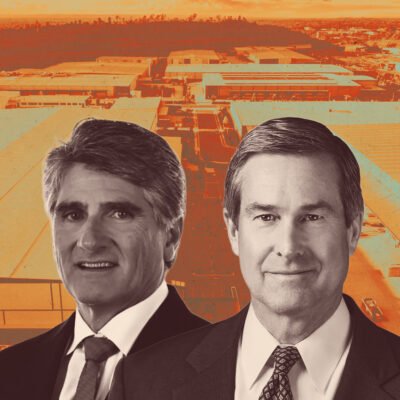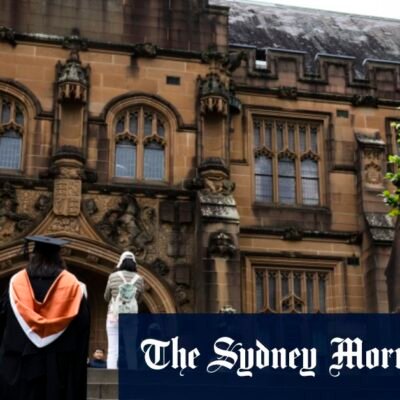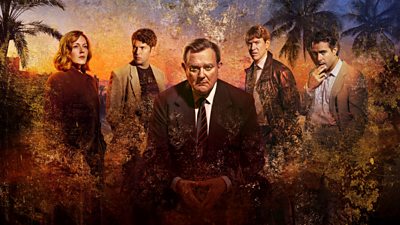
Critically-acclaimed factual drama The Gold will return on Sunday 8 June. All episodes will be available to stream on BBC iPlayer from 6am, ahead of the series starting on BBC One at 9pm that night.
The Gold is inspired by the true story and theories of the 1983 Brink’s-Mat robbery, which saw the theft of £26 million worth of gold bullion, and the decades-long chain of events that followed.
The Gold series 2 synopsis
Following the conviction of some of those involved in the theft and handling of the Brink’s-Mat gold, the police realised that they had only ever been on the trail of half of the Brink’s-Mat gold. Series two is inspired by some of the theories around what happened to the other half. As the police investigation continues, it becomes a tense, high-stakes journey into international money laundering and organised crime. The Brink’s-Mat Task Force embark on a series of dramatic manhunts as they desperately try to solve the longest and most expensive investigation in the history of the Metropolitan Police.
Interview with Neil Forsyth (creator, writer and executive producer)
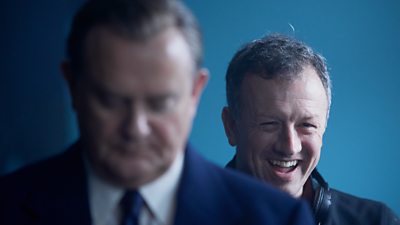
Can you give a recap of what happened in series one?
Series One of The Gold is very much driven by the robbery itself and the aftermath. It focused on how people were dealing with getting rid of the gold, smelting the gold and selling it back into the system. It also shows some of the primitive money laundering that came from that, the police chase of those that were involved with the robbery and those that were immediately involved in the aftermath.
How would you describe the second series of The Gold?
The second series of The Gold picks up from the first series when the police realise they were only ever chasing half of the gold. This series follows the second half of the Brink’s-Mat gold and it’s also a story of the consequences faced by several of our key characters across the entire show. I always saw The Gold as a two series show, following the two halves of the gold, so this will be the final series.
How has this series evolved from series one?
In the second half of The Gold there are certain similarities to the first series, in terms of the broad strokes of the story, but they’re also very different in the places that the gold and the money went and the people that it brought into the story – so it’s more expansive compared to series one. In this series, we go into some exciting new worlds – we go to the Isle of Man, the Caribbean, Spain and Tenerife (the latter three all filmed in Tenerife). These are all journeys that begin in South London, with the original Brink’s-Mat robbers. The story travels from Britain around the world, while keeping that British heart to it, and in terms of the criminality we examine a new level of money laundering and professional crime. In this series, the journeys that our characters go on end far beyond their home bases and their home networks.
It’s also unpredictable and surprising and that’s what was exciting for me when we were researching the show as we would find these lovely little nuggets that I could extrapolate out into storylines. Often, this unearths stories that have not been widely reported or widely known and people that were not convicted for their crimes. For example, there’s a whole storyline in the opening episode of this series, which is based around a theory that some of the gold was hidden in a tin mine in Cornwall. That came from one article the researcher Adam Fenn and I found in the Evening Standard from the 1980s which we decided to explore in the opening of series two, and that is the kind of reward you get for putting in the research. It’s very exciting for me knowing that that’s never been dramatised before, and it became a key part of our opening episode.
What research did you do for this series and how close is the series to real life?
We do a huge amount of research with The Gold, but then we have to tell a cohesive version of a very complicated story, so of course creative licence is used for that and other reasons. But the series is very much inspired by real events.
This series sees some of the cast from series one return, but also some new faces. What can you tell us about the new characters for series two?
Some of the new characters this series include Tony Lundy (Stephen Campbell Moore) Douglas Baxter (Joshua McGuire) and Logan Campbell (Tom Hughes).
Douglas Baxter is a composite character inspired by some of those involved in the Brink’s-Mat story. Baxter is an Isle of Man financial advisor who gets brought into the story by Charlie Miller and he ends up being part of an extensive money laundering chain that stretches all the way to the Caribbean. He’s a really interesting character in our show, and I think he’s brilliantly played by Joshua McGuire.
Logan Campbell is also a composite character inspired by of some of those involved with the Brink’s-Mat criminal enterprises, in this case – the laundering of a huge amount of money that was produced by the proceeds of the Brink’s-Mat robbery. He was already criminally minded, laundering money for a South American drug cartel in the Caribbean. As a result, his involvement creates a very complicated and very dangerous turn in the Brink’s-Mat story. For me, it was a wonderful find in the research and a really interesting aspect. You almost couldn’t get further away from the Brink’s-Mat Heathrow depot than the Caribbean, and having this well-respected member of the expat community that ended up laundering Brink’s-Mat money was fascinating.
The Brink’s-Mat investigation, at the time, was the longest and most expensive investigation in Scotland Yard history. In the latter years, the team was depleted, and we represent that in our show where we really stripped back the police operation to our three main police characters – Brian Boyce (Hugh Bonneville), Tony Brightwell (Emun Elliott) and Nicki Jennings (Charlotte Spencer) – joined by the new arrival of Tony Lundy (Stephen Campbell Moore). Having that stripped back police operation gives it a real narrative purity, as they are bound together at that point and just have to see it to the end. I think they did so much brilliant detective work, but it was such a complicated case and they were learning as they went. That’s the other thing with Brink’s-Mat, the same as series one, they’re learning new forms of investigation as they go. They were having to form new alliances, they end up working with the DEA (Drug Enforcement Administration) in this series, for example. It was such a nimble fast-moving investigation. For me, that was a gift in terms of the energy it gives the show.
Why do you think The Gold series 2 is unmissable TV?
It’s a complicated story, The Gold, and I think it’s hopefully told with a bit of nuance and complexity. Series one seemed to land well, in terms of how it was received, and having those huge viewing figures which was just amazing.
I’ve never written something before that has that effect and a lot of the actors talked about hearing people talk about it on the tube and the bus and so on. It’s rare for a TV show to have that kind of impact these days and it was a lovely thing to be part of. I think we’ve told the story in a style and tone that feels unique and, for me as a writer, that has to be the aim. You want to write something with a voice and feel that you’ve told a story in a way that no-one else could have told it.
Interview with Hugh Bonneville (Brian Boyce)
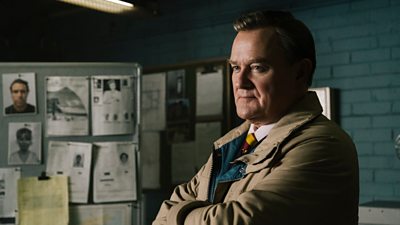
Why do you think The Gold appeals to viewers?
Gold is a mysterious metal. It’s been around forever, has survived every economic crash and adorns bodies all around the world. It’s synonymous with luxury and wealth. If you’ve got gold, you’re associated with the Midas touch. That’s the myth and the allure of this extraordinary commodity.
So, when a huge robbery involving gold takes place, your imagination is immediately sparked. In series one we learned about the process of smelting, bringing the proceeds to market, laundering the profits of the sale, and the effect of that money on people and on the economy. Goodies and baddies, cops and robbers.
What can you tell us about Brian Boyce and some of the trial and tribulations he experiences in series two?
In series two we see the ripple effect of even more gold being smelted and even more money being laundered. Our principal characters return and we see the effect the gold is having on them and the impact the proceeds of the robbery has around the world.
Because the money is spreading so far and wide it proves increasingly difficult for Boyce and his team to keep up, especially as their operation – already criticised for being the most expensive in police history – is facing pressure to scale back in the face of limited results. As far as his superiors are concerned, Boyce hasn’t put enough of the bad guys behind bars.
In reality the police investigation, extraditions and trials went on for a good ten years after the initial robbery and within that time Boyce was facing retirement. He so wanted to finish the job before retirement came but it wasn’t to be. So that pressure underlies Boyce’s story, as does the pressure from ‘upstairs’ to produce results, as the perceived runaway costs of the investigation are weighed against the apparently diminishing returns. Dogged police work wins the day.
This series is set in the 90s – how does it compare in the UK and in the international scenes in this series?
In the 90s in the UK, we’re entering a recession, it’s grey, gloomy and everyone’s a bit down in the mouth. In contrast, you’ve got John Palmer and the others enjoying the Life of Riley in Tenerife and even further afield, living off the fat of their exploits. This provides a striking visual contrast: the bleak and drab world of Boyce’s operations centre, now a basement in the Tottenham Court Road, juxtaposed with Palmer’s sunshine villa in the Canary Islands. Where is justice? Does crime in fact pay?
What are the key themes of the second series?
The word that springs to mind is consequences. The consequences of the gold having been stolen and the extraordinary ripple effect that it has, not only through the British economy but around the world. We see its impact in Tenerife, through John Palmer’s operations, we see how it is developing in Tortola in the Caribbean and we also have the Russian mafia getting involved. The implications are huge, and the consequences of the actions of six men in a van really do have a worldwide impact.
Can you explain the dynamic within the Flying Squad this series?
Boyce can be seen as a benign sometimes irritated figure, rolling his eyes at his two protégés, Jennings and Brightwell. His attitude changes, though, as he acknowledges in his own taciturn way that they are good at their jobs.
The dynamic between Jennings and Boyce in particular is quite endearing, almost a father-daughter relationship. She’s sometimes like an enthusiastic puppy who needs bringing back into line. Boyce often utilises his own brand of wry cynicism to remind her of her training and her place on the team. Brightwell is like a loyal, dogged place hound. He’s always on the case, firm, committed and I love the dynamic that’s developed between Jennings and Brightwell. The operation to which they’re yoked, that was once very much in the public eye, has been downgraded. But they struggle on regardless, feeling for Boyce as he does battle with his superiors who want results. Boyce’s reliance on his protégés, Jennings and Brightwell, becomes key.
But what really shifts the dynamic is the arrival of Tony Lundy on the team. He couldn’t be more different to Boyce. He gets results, put it that way. Boyce ends up having a grudging respect for him, too. As long as Boyce doesn’t know how he’s got this or that result, he’s prepared to let him get on with it and do it his way. It’s a really interesting relationship. Lundy is maverick, he doesn’t do things by the book. He’s the sort of man Boyce could never be or want to be, but Lundy achieves things on the edge of the law that bring the kind of results Boyce and his team so desperately need.
Interview with Emun Elliott (DI Tony Brightwell)
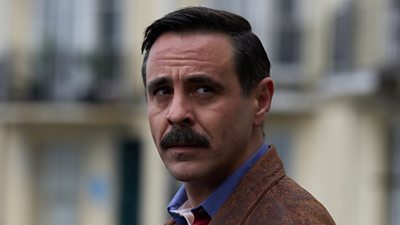
Can you recap what happened in series one?
In November 1983, six guys in a van nicked £26 million worth of gold from a storage unit in Heathrow Airport. That gold went on to create some of the biggest criminal enterprises in history. In series one, Brian Boyce and his taskforce make every effort to track down that gold and never ever do but what they do is they begin to chase the money. Series one is very much a cat and mouse chase of a police force using new techniques, facing a situation which is completely unprecedented, in an effort to track down a huge amount of gold.
What can you tell us about Brightwell in series 2?
Brightwell is very much developed as a detective – he’s much more confident, much more self-assured, even more relaxed in his procedure and ability. His connection with Brian Boyce and Nicki Jennings is much deeper and stronger.
What was it like filming in Tenerife?
We were filming in Santa Cruz, which is the capital of Tenerife, because in the second series of The Gold, we go international in terms of storytelling. Series one was very much London centric, although there was a tiny little bit where Jennings and Brightwell nip off to Sierra Leone for around a day and there’s a little bit on the south coast of Spain. This time, the story really expands in terms of scale, and we really go international as the money starts to find its way all over the globe.
In Series two, there really is the sense of scale as the money is growing. It’s spreading like a virus all over the planet and because of that, we needed lots of different locations which we’ve managed to find in Tenerife – it becomes the Caribbean, it acts as the south of Spain and as Tenerife itself. Series two just feels like a much bigger, more epic story. Tenerife is a volcanic island, it’s hilly, it’s flat, it’s beachy, so it’s perfect for an international filming location.
How would you describe Brightwell and Jennings’ tactics to get to the gold?
It often feels that Jennings and Brightwell are just a second too late. They always seem to have the right idea and their eyes in the right place, hunting the right person and are on the right track, but every time we get there, we’ve just missed the boat.
At this time, the police did not have the technologies that we have now. We see Jennings, Brightwell and Boyce using new technologies – new systems like wires and listening devices. But even still, these things were very primitive technologically, so they’re sort of fumbling their way through and because of that they often just miss the boat. However, that does nothing to thwart their determination.
What is Brightwell’s motivation?
I think what drives Brightwell is, not only is it his job, as he’s always been very passionate about his job, but also about learning new skills. So, when he’s allowed to explore money laundering and really get into the figures, and look at the way that this money moves, he’s kind of fulfilling this passion. Also there’s a personal connection because they lost one of their colleagues in series one, who was tragically killed. It becomes very personal in terms of payback and he becomes very determined to seek justice.
Interview with Charlotte Spencer (Nicki Jennings)
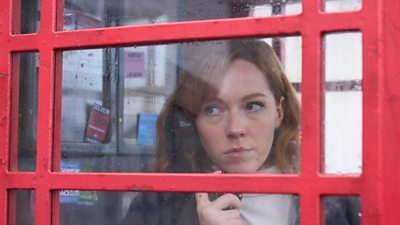
What has it been like to return to this role and work closely with Hugh and Emun again?
The Gold is one of those special jobs that only comes around once in a while where you truly love the people you work with, and who become good friends. I’ve loved coming back to reprise this role. Jennings is a great character and I get to work with people I adore on and off screen. Emun and Hugh are mates now so they’re never getting rid of me!
How would you describe Jennings’ look in the second series?
Jennings in this series has got into her groove a bit more, she’s more comfortable with herself now and understands the job and what’s she’d doing.
Her look is more 90s and a bit more relaxed, but she still has some amazing outfits. I have this amazing green coat, which I just adore. Obviously, that was for the London scenes, not for Tenerife! There’s one outfit she wears in Tenerife, and we were joking that it looked like I could have been in Jurassic Park, it was great.
It’s subtle because things change slowly or there might be odd thing that comes in. I’m still obsessed with the phones, as I was in the first series. Every time I see a phone on set, I’m like ‘oh look at this one!’. In this series, we’ve also got the mobiles which were like bricks but they’re great.
In series two, Tony Lundy joins the team. How does Jennings respond to that?
Jennings doesn’t like Lundy when he first arrives, she does not trust him. I compare Jennings to a rottweiler, for some reason I always compare my characters with animals, but she’s very loyal and feels she knows right from wrong. When he comes in and she knows he’s possibly a bent cop, she’s not entirely sure about him and she’s very protective over Brightwell and Boyce. She just wants to catch the bad guys and to bring people to justice. I don’t think she’ll stop until it happens.
Interview with Tom Cullen (John Palmer)
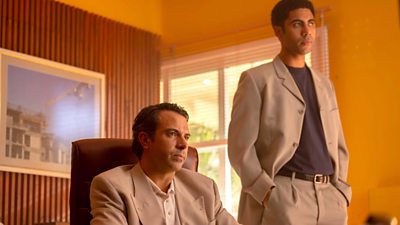
How would you describe John Palmer in this series?
In series one we leave John Palmer as really the only guy that got away with it. He was found not guilty in the Old Bailey for his part of the smelting of the gold, through saying that he didn’t know that it was Brink’s-Mat, which of course is highly suspect.
There’s quite a large leap in terms of John Palmer from series one to series two. We pick him up at his kind of zenith. He ran a very large timeshare business which we see the genesis of in series one but now it’s at its absolute peak and it was an incredibly successful business for a long time. We also see him on The Sunday Times Rich List next to the Queen where he’s worth a reported £150,000,000. I think that he sees himself being on the Rich List as a chance to distance himself from the Brink’s-Mat robbery because it puts his money down to his legitimate business affairs in Tenerife as a timeshare king. We start with him in a Rolls Royce, beautiful suits, feeling very good about himself. He’s a man who is consumed with a need and a drive to be more than his beginnings. John Palmer came from an extraordinarily impoverished background. He left school at a really young age unable to read or write and he bettered himself within the world in which he knew how to do, and that was in crime.
What are the themes of the series?
The themes of the show are a continuation of series one, in that it’s about class, it’s about money, it’s about greed. It’s about how money can be like an infection, and it can change the very makeup of a person. I also think it is about consequences. What happens if you push beyond your limits?
How would you describe Palmer’s look in series two?
Palmer’s style has definitely evolved since series one. In series one he was in big baggy jumpers and ill-fitting jeans. The more money that he’s got, the more he’s stepped into what he perceives is that world. So, the world of affluence. He’s fully embraced the 90s baggy suit which is hilarious. When I was wearing them, I just felt like I was a little boy wearing my dad’s clothes – they are enormous, but they are fantastic. He’s also got a plethora of ties that only your kind of horrible, funky uncle would wear. John Palmer in real life, I think the word would be to describe him was softer. In series one, I physically embraced that and was softer but for this series I’ve got a little bit fitter, but still kept the John Palmer element to him. He never looked like a supermodel, but I think that it’s all about looking good for him. Stylistically I think the show’s evolved beyond series one anyway. Purely because we have a different creative team – we have a new director, new DOP and they are moving it into the 90s. It’s all about hope and colour and money, and that’s where our show has gone.
What can you tell us about John & Marnie’s relationship in this series?
One of John’s key relationships is with his wife Marnie (Stefanie Martini) who was in series one. She kind of acts as a reminder of who he was and where he came from, she was just trying to ground him. She can see that he’s disappearing, and she wants him back. Marnie constantly reminds him that they have enough and that it’s time for him to stop. But he just can’t. He’s on the train and he’s putting more coal into the fire.
Interview Sam Spruell (Charlie Miller)
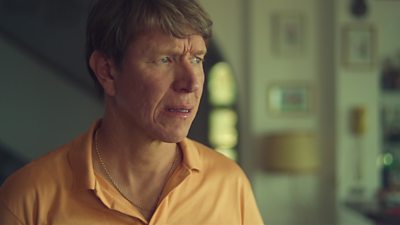
How would you describe Charlie Miller?
Charlie Miller is an amalgam of various alleged southeast London criminals involved in the Brink’s-Mat robbery, he is no one specific. You see Charlie really at the end of the first series as he’s one of the Brink’s-Mat robbers. He ends up at the beginning of the second series in possession of half the gold. Throughout the first series the police thought they were dealing with all the gold but actually there is another half that Charlie Miller kept for himself.
How does the story of the gold evolve in series two?
Whereas the first series was about melting the gold and then cleaning it by reintroducing it into the system for money, this series is more about laundering money internationally. I think Charlie certainly has aspirations to be a more legitimate businessman. Through his criminal network in south London, of which Charlie has been a part of for years, he discovers the presence of Baxter who is cleaning small amounts of money for establishments like pubs and other places like that in south London. Charlie sees this guy with his Cambridge education as the right man to clean a very large amount of money that he is going to make from getting rid of this gold.
Can you tell us about the journey of Charlie’s half of the gold?
When you have a lot of gold that’s as pure at the Brink’s-Mat gold you have got to make it dirty because it’s too clean and too recognisable as the Brink’s-Mat gold. Having hidden it for years, Charlie then takes it out of hiding and transports it to a traveller community. They melt it down with other metal to make this pure gold dirty. This dirty gold then goes to a jeweller who melts it down again and integrates it into the system of goldsmiths and people who deal with jewellery and all things fine. It disappears into the system and money is made from that. That money must be cleaned because you can’t just kind of put lots of money into a bank, otherwise people will ask where it has come from and that’s when you start getting into hot water. So, you need to introduce that money into a financial system. Baxter is the initial point man for that but in the end, it takes someone with Logan Campbell’s clout to put that back into the financial situation in terms of investments in all kinds of stuff, whether it be fossil fuels, a new business venture or housing companies, for example.
How would you describe Miller’s look in series two?
Miller wears quite a lot of oversized clothes and I really like the double breasted, shoulder padded silhouettes that we can get away with, which Miller tries out. I think he’s a bit of a peacock and I think he enjoys his newfound wealth. He enjoys spending it on clothes, gold and jewellery, for example. He is not shy in showing that he has got some money in his pocket. Then there’s the whole plethora of bathing suits and Speedos which I can only apologise to the viewers for.
Interview with Stephen Campbell Moore (Tony Lundy)
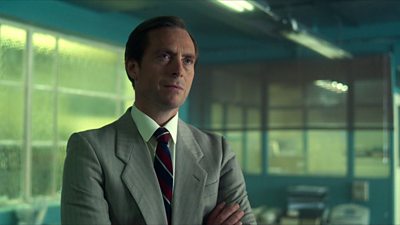
Your character is new to series two. How would you describe Tony Lundy?
Tony Lundy is a real person and he has, what seems to be to the audience, a slightly checkered past. When we first meet him, he looks to be at the end of his career. He has survived an enquiry into corruption, but he’s been told by the bosses there is nowhere else for you to go, you need to retire.
He doesn’t want to retire, and he gets brought by Boyce to be a part of the Brink’s-Mat investigation which at this point is at an extremely low level and it seems to have ground to a complete halt. Lundy operates slightly outside of the system. He has his own contacts and his own way of doing things because he doesn’t feel that following protocol is going to get him what he needs. So, he tries to fast forward and expedite things.
Lundy doesn’t take anything too seriously on the surface but actually he’s incredibly focused on getting his man. When we first see him, he talks about the lone ranger and for me that seems to be a template for him. He’s an old school guy. He sees himself as a hero trying to get the villain and at base that’s always what he is trying to do. It’s about people, it’s not necessarily about money.
Lundy joins The Flying Squad to help the investigation. How would you describe the dynamic?
He’s very different to Boyce, Jennings and Brightwell and I think he’s fully aware when he comes into that group of two things: he’s actually very grateful to Boyce for bringing his career back into shape and giving him a job and a purpose. He is also aware that the other’s opinions of him maybe slightly checkered and he is not in the business of trying to prove to anybody else that he isn’t what they think he is. He just remains himself all the way through and I don’t think he’s too concerned about what they think about him. As they develop and they get a working relationship, there is mutual respect and there’s actually quite a lot of humour between them as well. I know that deep down with Boyce he’s extremely grateful for the opportunity he’s been given.
With Boyce and the investigation as a whole, it moves from catching the criminals to retrieving as much of the money as they possibly can. This gold is spreading, getting reintegrated into the market and there is money laundering going on. For Lundy, he’s a bit more old school and his real motivation and real passion is tracking down the criminal, finding out where he is and there is a sort of fixation that he has. Although he does it with a lot of humour, there is a part of him which is just laser focused on Charlie Miller. It becomes a chase.
Why do you think The Gold stands out?
I watched first series of The Gold and I really loved that it was a multicharacter story in which there weren’t first and secondary characters. Everybody was a primary character in their own life and I think that’s because it is inspired by a true story and by real people, meaning you’re able to draw these portraits of minor and major figures and give them all a credible life.
I think that there is something really fascinating about a story which is inspired by a true crime. There is real interest, especially in the way something like this is written, in getting behind both the people who are chasing the villains and the villains themselves. You integrate yourself into all of their hearts, all of their tracks, all of their thoughts. It’s a tried and tested formula in the sense of bank robberies and things like that. It’s the possibility and the people who dare to do those things – the people who think that in some ways it’s a victimless crime, and then it spreads out.
For The Gold, I think what makes it very particular is that it’s about a growing conspiracy. It’s about how something starts off small and that there is an element of accident involved in it, of jeopardy. This small group of people who were trying to change their lives by breaking in the Brink’s-Mat, they then have to widen that conspiracy. When you widen a conspiracy that trust has to extend out to a larger group of people. For the police that is such an interesting aspect, as once you get a sniff of those people who are part of the wider conspiracy you can break them to get back into the centre. I think there is something about true crime which is very thrilling because people are on the edge when they are involved in it.
How would you describe Lundy’s trials and tribulations?
Lundy in a way he goes full circle. We meet him when he’s at the very end of his career, he’s hit an absolute brick wall. Then he’s given a chance and in a way it’s his dream job. He’s chasing a man across borders and he’s trying to zone in on him. I think with Charlie Miller, he finds somebody who perhaps is not so easy to track down. He doesn’t have the same weaknesses as other people. He’s not boastful, drunk or he’s not going around with flash sports cars or anything like that. Miller also seems to have a sort of second sense of when to get out or move and it’s never the way that Lundy thinks he is going to. Of course, this is exciting for him but there are also tribulations. I think within this story, as he pushes forward and they are heading towards what looks like a resolution, that thing from the very beginning comes and hits him again. He’s reached the end of his tether. He describes the fact that he took up running because it was a way of getting his anger out. I think he felt that it was very unjust that he was being treated like this by the force that he had served for such a long time. In the end, he’s had enough and he wants to start a new life.
Interview with Tom Hughes (Logan Campbell)
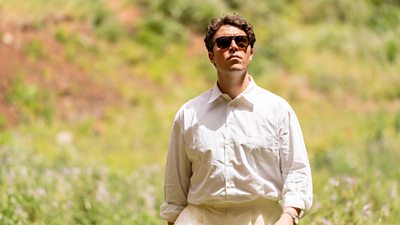
How would you describe Logan?
On the surface Logan appears to be someone who has everything. All in balance. Success and contentment. But it’s a veneer. A creation. Underneath is a well of complexity and self-loathing and pain. He’s running away from himself in many ways and that makes him dangerous, and cold to the touch. But his coldness permeates within also. Cold towards himself. A lost man within a world of aspiration. An enigma.
What can you tell us about Logan and Kadene’s relationship?
I think his relationship with Kadene is the only relationship he has had since he was a young man that’s real, but he can’t stay close to it because he will get found out. She’ll see him. The real him. I don’t mean it in terms of what he is doing day to day, because that will come by proxy, but she senses his pain and his isolation. She’s everything he would ever want in a companion. And therefore, he’s terrified of opening up to it. Because it would mean opening up to himself. He needs her close, he wants her close. But not too close, because he’s terrified of that.
Why The Gold series two unmissable TV?
It’s just got a pulse, a rhythm and an honesty to it, but it’s also got this thrill, pace and humour too – hopefully all the ingredients that people want in a great TV show. I think throw into the mix the added ingredient of the fact that this is inspired by something real that people can remember and it’s a very intriguing story which gives it an extra ingredient of spice and I think it just makes for great TV. In series one, perhaps people might have known more about the story that inspired this but, in this series, I think it’s got an intrigue to it because it shows parts of the real elements that have inspired this show but also opens a window into things perhaps you might not have considered before.
Interview with Joshua McGuire (Douglas Baxter)
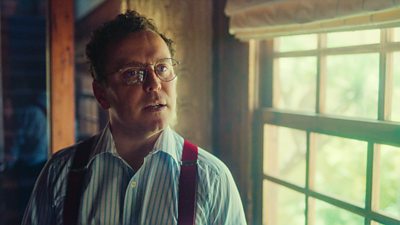
Who is Douglas Baxter?
Baxter is a graduate of Cambridge and he is down on his luck. He’s a lawyer but offers his financial services to essentially launder money on the Isle of Man because they’re a bit more lax there. He is the other side of a criminal conviction for drug possession.
He’s nowhere near where he wants to be in life and he has very high opinions of himself, in some ways, quite rightly – he’s very intelligent, grammar school educated, he calls himself the ‘finest legal mind of his generation’, whether or not that’s 100% true?
How did you prepare to play Baxter?
It was so exciting to come in and be part of the second half. Sometimes I think that can be quite nerve wracking because it’s something that’s already rolling, there’s a sort of language that already exists and you’re stepping into it. But it was just really nice to be able to feel part of an expansion of something.
Everything I needed for Baxter was all in Neil’s writing. It was all there on the page and it’s always, for me, the most important place to jump off. I absolutely tried to garner as much information as I could. Neil and the researcher from series one wrote a book off the back of the first series, and Neil gave me that, which I found incredibly helpful.
What are the key themes of The Gold series 2?
One of the themes the second series explores is greed, a continuation of a theme from series one, as well as levels of wealth and how that places one in society. Consequences is also a big theme here. Series one began with a heist, and from there the ripples of that one action and the consequences of that heist touched so many people in so many parts of the world, it just shows you how one action can have multiple consequences for many different people.
The consequences of it hitting Baxter are initially very beneficial to Baxter, as he isn’t where he thinks he should be in life, both personally and professionally, so the dollar signs in his eyes are very evident. However, he just gets in too deep, he gets out of his depth, and the consequences for Baxter are all consuming.
Who are Baxter’s key relationships?
Baxter’s main connection, through the web of the criminal conspiracy, is Charlie Miller who enlists him initially to launder his money. The other crucial relationship would be with Logan Campbell, his old university friend who Baxter then enlists to further help with the money.
Why do you think people should watch The Gold series two?
I think the thing that makes The Gold stand out is the characters, the characters are so brilliantly written. Neil draws them so specifically. Also, the fact that it is the final series, as it is a limited two series and done, there’s a sort of tying up and encapsulation. There’s not going to be a cliffhanger, just a nice tied up ending.
Cast and Creatives
Cast
Brian Boyce – Hugh Bonneville
Nicki Jennings – Charlotte Spencer
Tony Brightwell – Emun Elliott
Kenneth Noye – Jack Lowden
John Palmer – Tom Cullen
Marnie Palmer – Stefanie Martini
Charlie Miller – Sam Spruell
Tony Lundy – Stephen Campbell Moore
Douglas Baxter – Joshua McGuire
Jerren – Joshua Samuels
Logan Campbell – Tom Hughes
Alice Harper – Tamsin Topolski
CS Cath McClean – Amanda Drew
Assistant Commissioner Gordon Stewart – Peter Davison
Lena – Antonia Desplat
Enrique – Sean Teale
Kadene – Rochelle Neil
Lauretta – Lorna Brown
Harry Bowman – Silas Carson
Jed Nixon – Thomas Coombes
Alyssa – Olivia Grant
Creatives
Neil Forsyth – Creator, writer and executive producer
Ben Farrell – Executive Producer for Tannadice Pictures
Nick Lambon – Executive Producer for BBC
Patrick Harkins – Director
Charlie Leech – Producer
Jane Harrison – Production Executive
Olivia Scott-Webb – Casting Director
Adam Fenn and Thomas Webb – Specialist researchers
Sophie Slotover – Hair and Make-up Designer
Grace Snell – Costume Designer
Eleanor Sindall – Production Designer
Simon Goff – Composer
Oli Russell – Director of Photography
EJ




